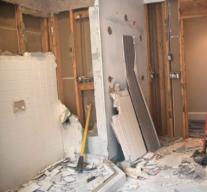Understanding the Cost of Home Renovations

Understanding the Cost of Home Renovations
Renovating your home can be an exciting journey, but it often comes with a myriad of decisions and considerations, particularly when it comes to budgeting. Whether you're planning a complete overhaul or focusing on specific areas like renovations, understanding how to estimate the cost is crucial for a successful project.
Assessing Your Needs and Goals
Before diving into the nitty-gritty of cost estimation, take some time to assess your needs and goals for the renovation. Are you looking to improve functionality, enhance aesthetics, or increase the resale value of your home? Understanding your objectives will help guide your decisions and prioritize your budget accordingly.
Budgeting for Different Renovation Projects
Renovations can vary significantly in scope and cost, depending on the areas of your home you're targeting. Let's break down the estimated costs for two common renovation projects: Bathroom Renovations and Improvements and Kitchen Renovations and improvements.
Bathroom Renovations and Improvements
Bathroom renovations are popular choices for homeowners looking to upgrade their living spaces and add value to their properties. When estimating the cost of a bathroom renovation, consider factors such as:
- Fixtures and Fittings: This includes items like toilets, sinks, faucets, showerheads, and bathtubs. Opting for high-quality fixtures can elevate the look and functionality of your bathroom but may come with a higher price tag.
- Tiling and Flooring: Tile selection, installation, and flooring materials will also impact your overall budget. Consider factors such as durability, water resistance, and ease of maintenance when choosing tiles and flooring options.
- Plumbing and Electrical Work: If you're reconfiguring the layout of your bathroom or installing new fixtures, plumbing and electrical work will be necessary. Be sure to budget for labor costs and any unforeseen complications that may arise during installation.
Kitchen Renovations and Improvements
Kitchen renovations are often considered the heart of the home, and upgrading this space can have a significant impact on both functionality and resale value. When estimating the cost of a kitchen renovation, consider factors such as:
- Cabinetry: Cabinets are a focal point of any kitchen and can vary widely in price depending on materials, finishes, and customization options. Determine whether you'll be refacing existing cabinets or investing in new ones to fit your budget.
- Countertops: From granite and quartz to laminate and butcher block, there are numerous options available for kitchen countertops, each with its own price point. Consider factors such as durability, maintenance, and aesthetics when selecting countertops for your kitchen.
- Appliances: Updating kitchen appliances can breathe new life into your space and improve energy efficiency. Factor in the cost of appliances such as refrigerators, stoves, ovens, dishwashers, and microwaves when budgeting for your renovation.
Additional Considerations
In addition to the specific costs associated with bathroom and kitchen renovations, it's essential to budget for other expenses that may arise during the renovation process. These may include:
- Labor Costs: Hiring skilled tradespeople such as plumbers, electricians, carpenters, and tilers will incur labor costs, which can vary depending on the complexity of the project and local market rates.
- Permits and Regulations: Depending on the scope of your renovation project, you may need to obtain permits from local authorities. Factor in the cost of permits and any fees associated with complying with building regulations.
- Contingency Fund: Renovation projects often encounter unexpected challenges or changes that can impact the budget. Building a contingency fund of around 10-20% of your total renovation budget can help cover any unforeseen expenses that arise during the project.
Final Thoughts
Estimating the cost of renovating your home requires careful consideration of various factors, from the scope of the project to specific materials and labor costs. By assessing your needs, setting priorities, and budgeting accordingly, you can embark on your home renovation journey with confidence, knowing that you've planned for success.
Whether you're tackling a bathroom renovation, kitchen remodel, or a comprehensive home improvement project, careful planning and budgeting will ensure that your vision becomes a reality without breaking the bank. So, roll up your sleeves, gather your inspiration, and get ready to transform your home into the space of your dreams.

